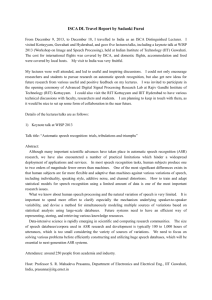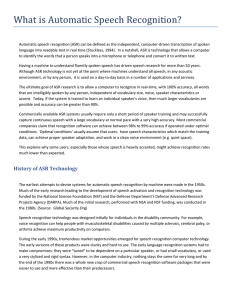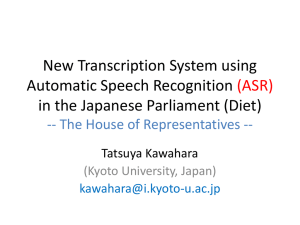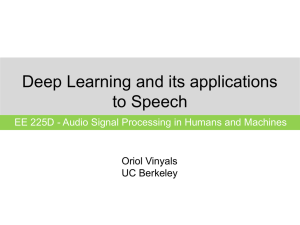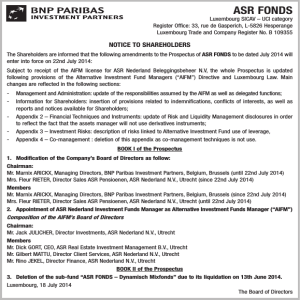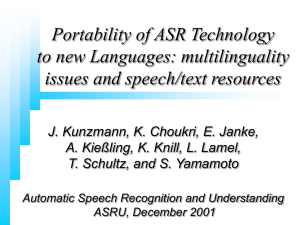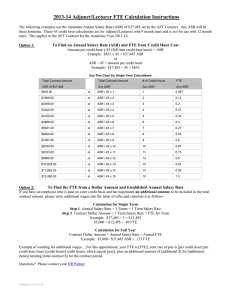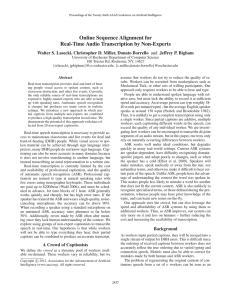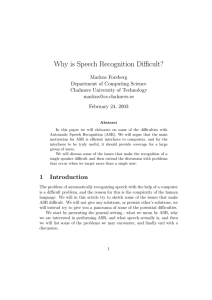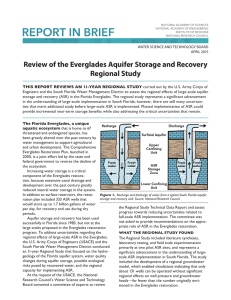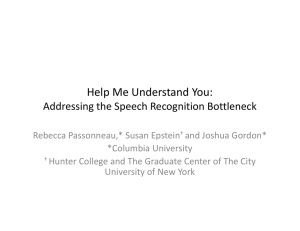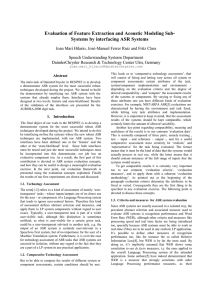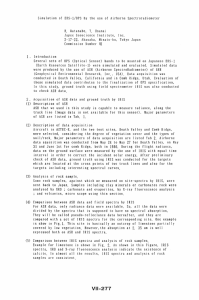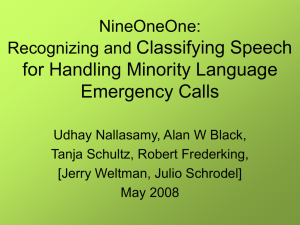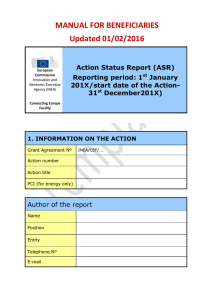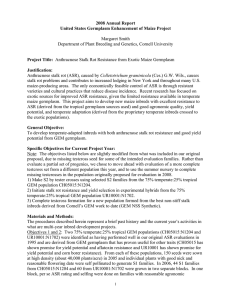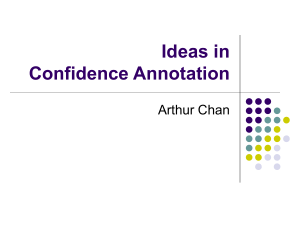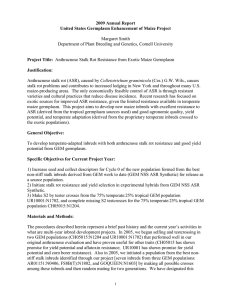Is ASR Ready for Classroom Teachers? - People
advertisement
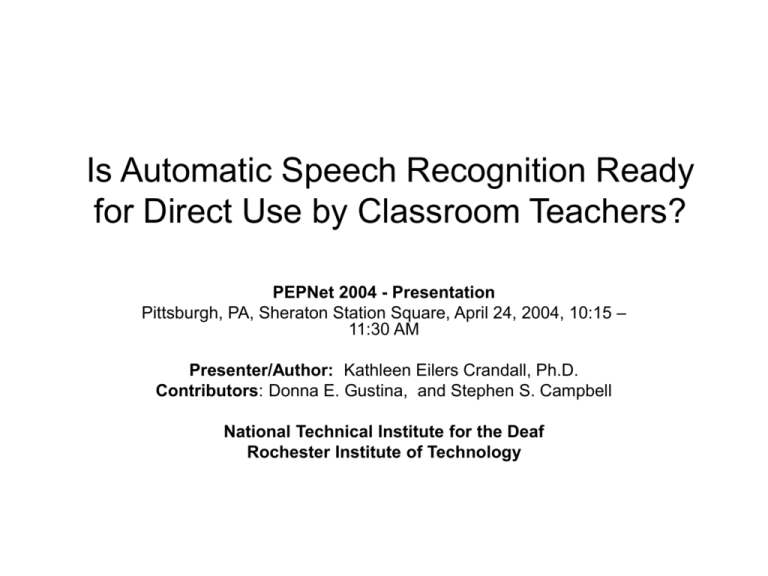
Is Automatic Speech Recognition Ready for Direct Use by Classroom Teachers? PEPNet 2004 - Presentation Pittsburgh, PA, Sheraton Station Square, April 24, 2004, 10:15 – 11:30 AM Presenter/Author: Kathleen Eilers Crandall, Ph.D. Contributors: Donna E. Gustina, and Stephen S. Campbell National Technical Institute for the Deaf Rochester Institute of Technology The Glossograph • Fay wrote about an experimental mechanical device used to transcribe human speech, and said, • “… it is not unreasonable to hope that some instrument will yet be contrived …“ Fay, E.A. (1883). The glossograph. American Annals of the Deaf, 28, 67-69. Sci-Fi or Reality? "The pen was an archaic instrument, seldom used even for signatures...Apart from very short notes, it was usual to dictate everything into the speak-write…” (Nineteen eighty-four. Orwell, 1949) Project • Direct teacher use of Continuous Automatic Speech Recognition: – English Classroom/Lab Funded by a grant from the Parsons Foundation of California English Classroom/Lab Project English Classroom/Lab Project Purpose Investigate direct use of ASR by classroom teacher to learn: • Is acceptable recognition level attained? • Under what conditions? – Style of speaking – Communication mode – Language complexity Related Work Use of ASR by an intermediary • Intermediary, a ‘captionist,’ re-speaks professor’s words into a computer • Intermediary summarizes professor’s words into a computer (‘interpreted speech’) • Intermediary may use C-print (a shorthand typing system) in combination with ASR http://cprint.rit.edu/ Related Work Use of ASR by the primary speaker • iCommunicator™ http://www.myicommunicator.com/product _info.html • Liberated Learning Environment http://www.liberatedlearning.com (St. Mary’s University, Halifax, Nova Scotia) English Classroom/Lab Project English Classroom/Lab Project Teacher -- Students • Teacher -- Speaker – Native speaker of American English – User of ASL as a second language – Trained the ASR equipment • Students -- Readers – Young adult college students who are deaf or hard-ofhearing – Reading and writing skills at the lowest quartile of entering students – Enrolled in basic level English language reading and writing courses English Classroom/Lab Project Evaluation Procedures • ASR Software: – Dragon Naturally Speaking – IBM ViaVoice – Microsoft Office • Speaking styles: – Spontaneous conversation – Dictation-like speech • Communication modes: – Speaking – Simultaneously speaking and signing English Classroom/Lab Teacher station Control system Smart Board & LCD Projector Student Stations English Classroom/Lab Project Accuracy Needs • Vary by population and message predictability – New vs. Known information – Fluent readers vs. Language learners – Reading for pleasure vs. Reading to master new information • CLOZE research and prediction of missing information English Classroom/Lab Project Results: ASR Software 100% 95% 90% Conversation Dictation 85% 80% 75% Drag on V iaV oice XP English Classroom/Lab Project Results: Communication Mode 98% 96% 94% 92% 90% Conversation Dictation 88% 86% 84% 82% 80% S im u ltan eou s Com m m u n ication S p eech O n ly English Classroom/Lab Project Results: Language Complexity 98% 96% 94% 92% Conversation 90% Dictation 88% 86% 84% 82% < 7th G rad e > 7th G rad e English Classroom/Lab Project Correcting Text • Error correction – What to correct – When to correct – How to correct Multitasking Demands • Normal tasks for speaker/teacher – Formulating ideas relevant to topic – Attending to learning needs of students – Meeting lipreading and sign language needs • Added tasks for speaker/teacher – Speaking to produce readable ASR text – Monitoring text – Making corrections Recommendations Discussion Questions Grammatical Correctness • Is ASR accuracy affected by the grammatical correctness of the user’s speech? • Student written responses spoken as written: Accuracy – 93.8% • Student written responses spoken after corrected: Accuracy - 94.3% Style of Speaking 1. Style of speaking that more closely resembles dictation approaches a usable accuracy rate. 2. Lowering the complexity does not improve accuracy. Conditions of Use Direct use of ASR by a language teacher -Useful only under very controlled conditions. • Illustrating the generation of written language • Demonstrating the use of notes and outlines to produce written text • Translating selected sign language utterances into English text during discussions ASR: Classroom Use Prepared Outline Teacher’s Screen Student’s Screen Considerations • Training – Critical to reach over 90% accuracy – Training with conversation • Corrections – Familiarity with strategies – Dictate, Spell, Right click • Equipment – Microphone headsets - design, comfort, and size – Demand on computer processor – Effect of optional settings Tips for Better Accuracy • • • • • • • Powerful computer No other programs running Consistent microphone placement Environment Training Profile Join user groups, such as msspeech@yahoogroups.com Language Processing Teaching/Learning Issues: • Does ASR promote the learning of reading and writing for Deaf and Hard-of-Hearing students? • How do students process this information? • Do students attend to multiple inputs? • Can teachers attend to this many tasks effectively? Presenter – Contact Information Kathleen Eilers-crandall, Ph.D. Department of English National Technical Institute for the Deaf Rochester Institute of Technology Lyndon Baines Johnson Building - 2264 Phone: (585) 475-5111 Fax: (585) 475-6500 Email: kecncp@rit.edu Web: http://www.rit.edu/~kecncp
